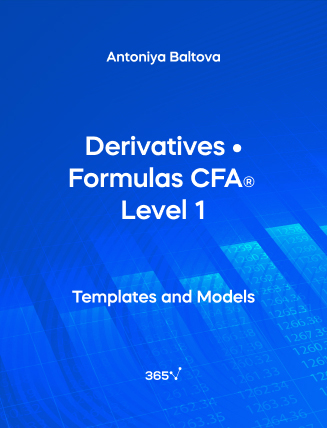Need an all-in-one list with the Derivatives formulas included in the CFA Level 1 Exam? We have compiled them for you here. The relevant formulas have been organized and presented by chapter. In this section, we will cover the following topics — Replication, Forwards, Swaps, Options, and the Binomial Model.
1. Replication
Long risk-free asset (lending)
Long~risk–free~asset~(lending) = Long~asset + Short~derivative
Long derivative
Long~derivative = Long~asset + Short~risk–free~asset~(borrowing)
Short asset
Short~asset = Short~derivative + Short~risk–free~asset~(borrowing)
2. Forwards
FRA settlement to the long
FRA~settlement~to~the~long= \frac {Notional~principal \times (Floating~rate - Forward~rate) Big( \frac {Days}{360} Big)}{1 + Floating Big( \frac {Days}{360} Big)}Days = Number of days in floating rate term
Floating = Floating rate
Forward = Forward rate
Forward rates
F_0(T) = S_0 (1 + r)^T
F_0(T) = Price of the Forward
S_0 = Spot price of the underlying asset
r = Risk-free interest rate
T = Time of the contract
Value
V_T(T) = S_T - F_0(T)
V_T(T) = Value of forward at time T
S_T = Spot price of the underlying at time T
F_0(T) = Price of the Forward
Net Cost of Carry
Net~Cost~of~Carry = ϒ - θ
ϒ = Benefits
θ = Costs
Forward Price with Net Cost of Carry
F_0(T) = (S_0 - ϒ + θ)(1 + r)^T
F_0(T) = Price of the Forward
S_0 = Spot price of the underlying asset
r = Risk-free interest rate
T = Time of the contract
ϒ = Benefits
θ = Costs
Value at any point during the contract (time t)
V_t(T) = S_t - F_0(T)(1 + r)^{-(T - t)}V_t(T) = Value at time t
S_t = Spot price of the underlying asset at time t
3. Options
Call Options
In-the-money: S_T > X
At-the-money: S_T = X
Out-of-the-money: S_T < X
| Call option Buyer | Call option seller |
|---|---|
| C_T = Max (0, S_T - X) Pi = C_T - P | C_T = -Max (0, S_T - X) Pi = C_T + P |
C_T = Call option’s value at expiration (T)
S_T = Stock price at expiration (T)
X = Option’s exercise/strike price
Pi = Profit
P = Option’s premium paid
Put Options
In-the-money: S_T < X
At-the-money: S_T = X
Out-of-the-money: S_T > X
| Put option Buyer | Put option seller |
|---|---|
| P_T = Max (0, X - S_T) Pi = P_T - P | P_T = -Max (0, X - S_T) Pi = -P_T + P |
P_T = Put option’s value at expiration (T)
S_T = Stock price at expiration (T)
X = Option’s exercise/strike price
Pi = Profit
P = Option’s premium paid
Put-Call Parity
S_0 + p_0 = c_0 + \frac {X}{(1 + r)^T}S_0 = Spot price of the underlying asset at time 0
p_0 = Value of put option at time 0
c_0 = Value of call option at time 0
T = Option’s duration
X = Exercise price of the option
r = Risk-free interest rate
Put-Call Forward Parity
\frac {F_0(T)}{(1 + r)^T} + p_0 = c_0 + \frac {X}{(1 + r)^T}F_0(T) = Forward price
p_0 = Value of put option at time 0
c_0 = Value of call option at time 0
T = Option’s duration
X = Exercise price of the option
r = Risk-free interest rate
4. Binomial Model
Up-factor
u = \frac {S_1^+}{S_0}u = Up-factor
S_1^+ = Upward value of the underlying asset after first period
S_0 = Value of underlying at time 0
Down-factor
d = \frac {S_1^-}{S_0}d = Down-factor
S_1^- = Downward value of the underlying asset after first period
S_0 = Value of underlying at time 0
Value of option on upward movement
c_1^+ = Max (0, S_1^+ - X) = S_1^+ - X
X = Exercise price of the option
c_1^+ = Option’s value after upward movement
Value of option on downward movement
c_1^- = Max (0, S_1^- - X) = 0
X = Exercise price of the option
c_1^- = Option’s value after downward movement
Synthetic probabilities
c_0 = \frac {πc_1^+ + (1 - π)c_1^-}{1 + r}c_0 = Value of call option
1 - π = Synthetic probability of downward move
5. Swaps
Plain vanilla interest rate swap
Fixed–rate~payment~(t) = (Swap~FR - LIBOR) \times \frac {T}{360} \times NPFR = Fixed rate
T = Number of days in the settlement period
NP = Notional principal
Follow the links to find more formulas on Quantitative Methods, Economics, Corporate Finance, Alternative Investments, Financial Reporting and Analysis, Portfolio Management, Equity Investments, and Fixed-Income Investments, included in the CFA® Level 1 Exam.

